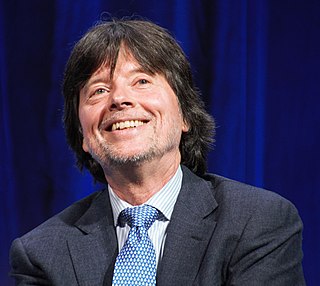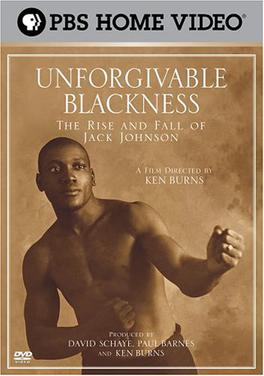
Kenneth Lauren Burns is an American filmmaker and historian known for his documentary films and television series, many of which chronicle American history and culture. His work is often produced in association with WETA-TV and/or the National Endowment for the Humanities and distributed by PBS.

Geoffrey Champion Ward is an American editor, author, historian and writer of scripts for American history documentaries for public television. He is the author or co-author of 19 books, including 10 companion books to the documentaries he has written. He is the winner of seven Emmy Awards.
Jazz is a 2001 television documentary miniseries directed by Ken Burns. It was broadcast on PBS in 2001 and was nominated for an Emmy Award for Outstanding Documentary or Nonfiction Series. Its chronological and thematic episodes provided a history of jazz, emphasizing innovative composers and musicians and American history.

WETA-TV is the primary PBS member television station in Washington, D.C. Owned by the Greater Washington Educational Telecommunications Association, it is a sister station to NPR member WETA. The two outlets share studios in nearby Arlington, Virginia; WETA-TV's transmitter is located in the Tenleytown neighborhood in Northwest Washington.

The War is a seven-part American television documentary miniseries about World War II from the perspective of the United States. The program was directed by American filmmakers Ken Burns and Lynn Novick, written by Geoffrey Ward, and narrated primarily by Keith David. It premiered on September 23, 2007. The world premiere of the series took place at the Palace Theater in Luverne, Minnesota, one of the towns featured in the documentary. It was funded in part by the National Endowment for the Humanities.

POV is a Public Broadcasting Service (PBS) public television series which features independent nonfiction films. POV is an initialism for point of view.

Unforgivable Blackness: The Rise and Fall of Jack Johnson is a 2005 biographical documentary by filmmaker Ken Burns, based on the 2004 nonfiction book of the same name by Geoffrey C. Ward. It describes the life story of Jack Johnson, the first African-American Heavyweight Boxing Champion of the World. It also describes racism and social inequality during the Jim Crow era, against which Johnson struggled.

Ric Burns is an American documentary filmmaker and writer. He has written, directed and produced historical documentaries since the 1990s, beginning with his collaboration on the celebrated PBS series The Civil War (1990), which he produced with his older brother Ken Burns and wrote with Geoffrey Ward.

George Masa, born Masahara Izuka, in Osaka, Japan, was a businessman and professional large-format photographer. He lived and worked in the United States.

World Channel, also branded as World, is an American digital multicast public television network owned and operated by the WGBH Educational Foundation. It is distributed by American Public Television and the National Educational Telecommunications Association and features programming covering topics such as science, nature, news, and public affairs. Programming is supplied by the entities, as well as other partners such as WNET and WGBH. It is primarily carried on the digital subchannels of PBS member stations.

The West, sometimes marketed as Ken Burns Presents: The West, is a 1996 television documentary miniseries about the American Old West. It was directed by Stephen Ives and featured Ken Burns as executive producer. It was first broadcast on PBS on eight consecutive nights from September 15 to 22, 1996.

The Ross Knox House is a historic Tudor Revival style residence in Mobile, Alabama, United States. The two-story brick and stucco house was completed in 1929. It is considered one of the best Tudor Revival houses in Mobile by the Alabama Historical Commission. Built in the 1920s upper-class suburb of County Club Estates, it was designed by architect John Platt Roberts.

Dayton Duncan is an American screenwriter, producer and former political aide.
Lewis & Clark: The Journey of the Corps of Discovery is a 1997 television documentary miniseries about the Lewis and Clark Expedition directed and co-produced by Ken Burns. It is produced by Burns' Florentine Films for Washington, DC PBS station WETA-TV, first aired on PBS on November 4 and 5, 1997.

Horatio's Drive: America's First Road Trip is a 2003 documentary film directed by Ken Burns and written by Dayton Duncan. Its subject is the first cross-country automobile journey in the United States, which occurred during the summer of 1903. The documentary focuses primarily on Horatio Nelson Jackson and his Winton car, the Vermont, along with his companions Sewall K. Crocker, his pet pitbull Bud and frequent correspondence with Jackson's wife Bertha Richardson Wells. The journey became a race among three teams, the winners being Jackson and Crocker.

Shelton Johnson is a park ranger with the U.S. National Park Service, and works in Yosemite National Park. As of 2023 he had worked in Yosemite for 30 years of his 37-year career.

The Public Broadcasting Service (PBS) is an American public broadcaster and non-commercial, free-to-air television network based in Crystal City, Arlington, Virginia. PBS is a publicly funded nonprofit organization and the most prominent provider of educational programs to public television stations in the United States, distributing shows such as Frontline, Nova, PBS NewsHour, Masterpiece, Sesame Street, and This Old House.

Lynn Novick is an American director and producer of documentary films, widely known for her work with Ken Burns.

Dalton Delan is an American writer, syndicated columnist, and television producer. He pens his syndicated column, the Unspin Room, for the Pulitzer Prize winning newspaper The Berkshire Eagle. His work with PBS and Sundance have won him numerous awards for documentaries and primetime shows. A number of his projects include working alongside notable figures like actor Robert Redford, Ken Burns and Henry Louis Gates Jr. Delan oversaw the production of sixteen In Performance at the White House programs in collaboration with the Obama administration, as well as several under the Bush and Clinton administrations years prior. As executive producer, Delan brought music giants like Bob Dylan, Paul McCartney, Mick Jagger, Stevie Wonder, Paul McCartney, Burt Bacharach, and Carole King to the White House. The final program under the Obama administration, The Smithsonian Salutes Ray Charles, is documented on YouTube as "WETA at the White House", features singers like Demi Lovato, Usher, and Anthony Hamilton.
Juanita Greene was an American journalist and conservationist. She worked for the Miami Herald as a reporter and wrote about Everglades National Park and Biscayne National Park. She was the Herald's first environmental reporter.

















